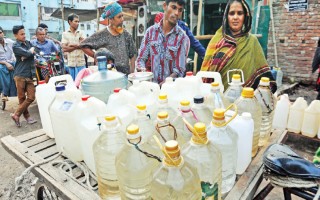WASAs lack sewage treatment efficiency
Water Supply and Sewerage Authorities in the country’s major cities still lack sewage treatment efficiency, raising concerns as almost all untreated wastewater generated there pollutes adjacent rivers and water bodies every day.
Against this backdrop, the World Water Day will be observed today in the country as elsewhere across the world with the theme ‘recycling wastewater to meet water demand.’
On the eve of the day, experts expressed disappointment over the snail pace in the implementation of development plans relating to wastewater treatment.
They said that wastewater treatment is a must to conserve the biodiversity as well as to reduce pressure on the ever shrinking groundwater storage.
Currently, only the Dhaka WASA operates a sewage treatment plant at Pagla in Narayanganj with a capacity of treating 1.20 lakh of the 20 lakh cubic metres of sewage, including humane facets, produced every day in the capital city.
Dhaka WASA officials said that the plant now could treat only 40,000 cubic metres of sewage due to clogged sewerage network.
Bangladesh University of Engineering and Technology professor Mujibur Rahman expressed dissatisfaction over the failure to implement the government’s master plan to construct at least 11 sewage treatment plants in Dhaka and its neighbourhood districts by 2025.
‘The authorities concerned failed to start the construction of at least five treatment plants within 2013,’ he regretted.
Department of Environment laboratory scientists said that they found dissolved oxygen in the water of Buriganga River far less than the standard as the water was highly contaminated with sewage pollutants because of unabated dumping of household wastewater.
With only 916km long sewerage system, Dhaka WASA so far left the major parts of the city including Uttara, Mohammadpur, Shaymoli, Banani and Jatrabari out of its sewage drainage network.
Dhaka WASA managing director Taqsem A Khan said that feasibility study on the proposed sewerage treatment plants at Uttara, Mirpur, Dasherkandi and Pagla phase-2, except Rayerbazar, had been completed.
‘We hope that the construction of the plants and expansion of sewerage network to the rest of the city would be completed by 2025,’ he said.
Officials of water supply authorities in Chittagong, Khulna and Rajshahi said that they still were yet to cover 100 per cent areas of their constituencies under the sewerage networks.
Rajshahi WASA managing director Azhar Ali said that about 22 million litre sewage was dumped untreated in the river Barnai per day due to lack of treatment plant.
Chittagong WASA deputy managing director Golam Hossain said that the authorities were still concentrating on bringing total city area under the sewerage network.
Local government and rural development ministry secretary Abdul Malek said that the government had directed authorities concerned to check untreated wastewater dumping into Buriganga.
He said that the government had plans to bring the major cities and municipalities under sewerage network and wastewater treatment projects in phases before 2030.
Government and non-governmental organisations have taken elaborate programmes to observe the day.
- See more at: http://www.newagebd.net/article/11739/wasas-lack-sewage-treatment-efficiency#sthash.IuQAi0EQ.dpuf











